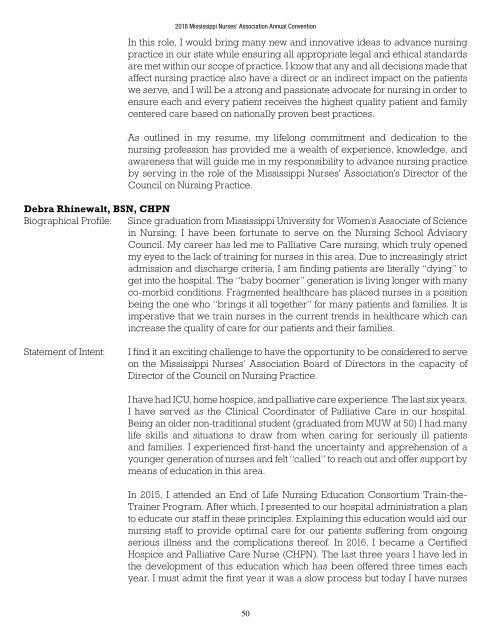2018 Mississippi Nurses Association Annual Convention Yearbook
You also want an ePaper? Increase the reach of your titles
YUMPU automatically turns print PDFs into web optimized ePapers that Google loves.
<strong>2018</strong> <strong>Mississippi</strong> <strong>Nurses</strong>’ <strong>Association</strong> <strong>Annual</strong> <strong>Convention</strong><br />
In this role, I would bring many new and innovative ideas to advance nursing<br />
practice in our state while ensuring all appropriate legal and ethical standards<br />
are met within our scope of practice. I know that any and all decisions made that<br />
affect nursing practice also have a direct or an indirect impact on the patients<br />
we serve, and I will be a strong and passionate advocate for nursing in order to<br />
ensure each and every patient receives the highest quality patient and family<br />
centered care based on nationally proven best practices.<br />
As outlined in my resume, my lifelong commitment and dedication to the<br />
nursing profession has provided me a wealth of experience, knowledge, and<br />
awareness that will guide me in my responsibility to advance nursing practice<br />
by serving in the role of the <strong>Mississippi</strong> <strong>Nurses</strong>' <strong>Association</strong>'s Director of the<br />
Council on Nursing Practice.<br />
Debra Rhinewalt, BSN, CHPN<br />
Biographical Profile: Since graduation from <strong>Mississippi</strong> University for Women’s Associate of Science<br />
in Nursing, I have been fortunate to serve on the Nursing School Advisory<br />
Council. My career has led me to Palliative Care nursing, which truly opened<br />
my eyes to the lack of training for nurses in this area. Due to increasingly strict<br />
admission and discharge criteria, I am finding patients are literally “dying” to<br />
get into the hospital. The “baby boomer” generation is living longer with many<br />
co-morbid conditions. Fragmented healthcare has placed nurses in a position<br />
being the one who “brings it all together” for many patients and families. It is<br />
imperative that we train nurses in the current trends in healthcare which can<br />
increase the quality of care for our patients and their families.<br />
Statement of Intent:<br />
I find it an exciting challenge to have the opportunity to be considered to serve<br />
on the <strong>Mississippi</strong> <strong>Nurses</strong>’ <strong>Association</strong> Board of Directors in the capacity of<br />
Director of the Council on Nursing Practice.<br />
I have had ICU, home hospice, and palliative care experience. The last six years,<br />
I have served as the Clinical Coordinator of Palliative Care in our hospital.<br />
Being an older non-traditional student (graduated from MUW at 50) I had many<br />
life skills and situations to draw from when caring for seriously ill patients<br />
and families. I experienced first-hand the uncertainty and apprehension of a<br />
younger generation of nurses and felt “called” to reach out and offer support by<br />
means of education in this area.<br />
In 2015, I attended an End of Life Nursing Education Consortium Train-the-<br />
Trainer Program. After which, I presented to our hospital administration a plan<br />
to educate our staff in these principles. Explaining this education would aid our<br />
nursing staff to provide optimal care for our patients suffering from ongoing<br />
serious illness and the complications thereof. In 2016, I became a Certified<br />
Hospice and Palliative Care Nurse (CHPN). The last three years I have led in<br />
the development of this education which has been offered three times each<br />
year. I must admit the first year it was a slow process but today I have nurses<br />
50

















